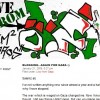As internet penetration has grown in Colombia, so has its participation in social networks and citizen media. Internet penetration had a slow start: 14.46% of the population had access in 2002, then 24% in 2007 and in 2009 it leaped from 38.5% to 46% in a matter of months. As in many other countries, access is primarily in the higher income brackets. Nevertheless, in the lower income bracket, around 30% have access and it is projected that it will soon grow to 50%. Most of the people go online through broadband access. But the great jump in connectivity had more to do with increased use of mobile internet through mobile devices. Higher speed and greater bandwidth means that in Colombia, it isn't necessarily the written word which is getting around, but video, images and file sharing.
Colombians go online mainly to communicate with others: Email, instant messaging, searches (mostly through google) and social networks. And boy, do they love their social networks. Colombia is #12 in number of users on Facebook worldwide, and heads Latin America (along with Brazil) regarding presence in other social networks.
They spend their time viewing and uploading pictures, writing comments, sharing files and watching videos. It seems blogging has lost its appeal, but twitter and facebook groups and pages are becoming the go-to destination online.
Facebook became popular with the One Million Voices Against FARC (Revolutionary Armed Forces of Colombia) march on February 4th 2008, organized completely on their platform and which spread virally through emails, message boards, forums, blogs and instant messaging. As the foundation with the same name writes on their site:
Después de un mes de preparación y gracias al enorme esfuerzo, el 4 de Febrero de 2008, 200 ciudades en más de 40 países alrededor del mundo logran inundar las calles con mas de 12 millones de personas que se manifestaron en simultánea contra las FARC gritando a viva voz: “No mas mentiras”, “No mas secuestros “, “No mas muertes “, “ No mas FARC”.
And now, in the midst of presidential elections, social networks are once again proving to be a thorn in the side of some candidates, and means of funding, support and activism for another: The Mockus Phenomenon and the Green Wave is how a Antanas Mockus, a presidential candidate with only 8% support managed to rally and raise the level of support to 36% in less than one month. It still isn't enough to avoid a run off, but some say that according to polls, he might win the elections against candidate Santos and that regardless of the results, he is the king of social networks.
“El de Mockus es uno de los diez portales de internet que registran mayor crecimiento a nivel mundial, y una de las 20 páginas de políticos más visitadas en el planeta”, aseguró Luis Sarmiento, administrador de esa campaña en la red.
Mockus is being called the Colombian Obama… but in the US internet penetration is at 78%. Will the power of the social networks truly affect the elections in Colombia, where only 46% of the population has internet access? We'll have to wait and see what happens on May 30th.












2 comments